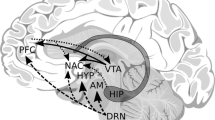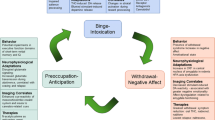Abstract
Rationale. Dependence on both alcohol and cocaine is a widespread example of polydrug abuse/dependence. It has been hypothesized that ethanol reward is mediated via increased dopaminergic neurotransmission in mesolimbic striatum, as is the case for cocaine. However, little is known about the neurobiology of ethanol in primates, or how the effects of ethanol compare to those of cocaine across individual animals.
Objectives. To determine in animals with a history of cocaine exposure whether there is a dopaminergic impact of ethanol in non-human primates, and if so, whether the magnitude of that effect correlates with the dopaminergic effect of cocaine across individuals.
Methods. Microdialysis studies were conducted in rhesus monkeys previously trained to self-administer cocaine. The dopaminergic impact of cocaine had been determined in those animals during cocaine self-administration sessions. Probes were placed in the ventral mesolimbic and associational central striatum. Ethanol was administered non-contingently by a slow intravenous infusion at doses of 0.5 g/kg (administered over 10 min) and 1.0 g/kg (administered over 20 min).
Results. The mean dopaminergic response to ethanol in four animals (with 2–4 trials in each animal at each dose) indicated a small but significant increase in extracellular dopamine at each dose (12% above baseline at 0.5 g/kg, 22% above baseline at 1.0 g/kg). Examining the responses across individual animals indicated substantial variability, in that two of the four animals showed no increase at either dose. Across individuals, regression analysis of cocaine-induced changes in dopamine with 1.0 g/kg ethanol-induced changes indicated a positive correlation between the drug effects, with a trend in this direction observed with the 0.5-g/kg dose of ethanol.
Conclusions. These results provide support for the ability of ethanol to elevate extracellular dopamine in the mesolimbic striatum, though with a modest effect size and variability among individuals. Further, they suggest that some common mechanism influences the effects of ethanol and cocaine on dopaminergic output despite seemingly unrelated pharmacological mechanisms of action.
Similar content being viewed by others
Author information
Authors and Affiliations
Additional information
Electronic Publication
Rights and permissions
About this article
Cite this article
Bradberry, C.W. Dose-dependent effect of ethanol on extracellular dopamine in mesolimbic striatum of awake rhesus monkeys: comparison with cocaine across individuals. Psychopharmacology 165, 67–76 (2002). https://doi.org/10.1007/s00213-002-1233-9
Received:
Accepted:
Issue Date:
DOI: https://doi.org/10.1007/s00213-002-1233-9




